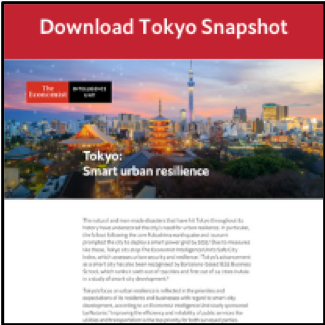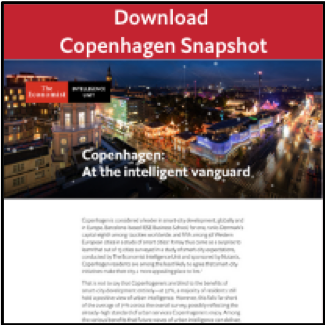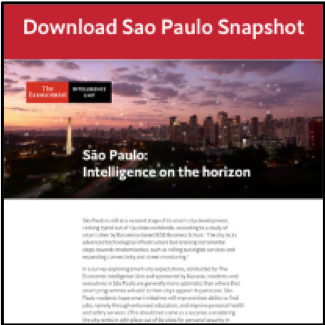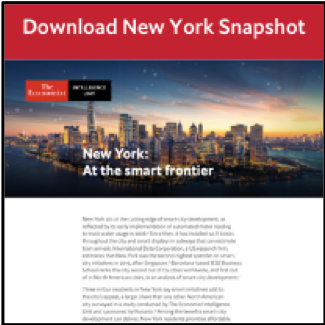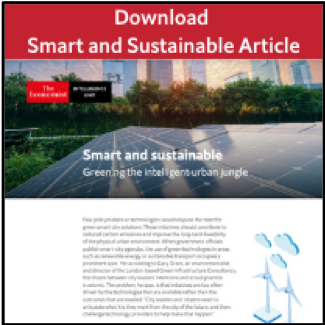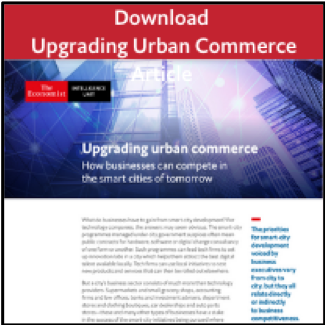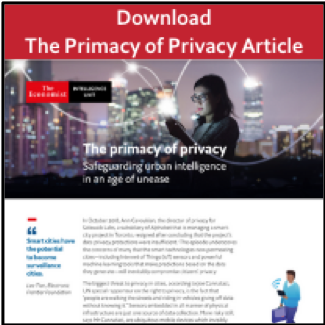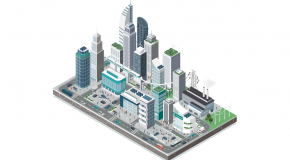About the research
Accelerating urban intelligence: People, business and the cities of tomorrow is an Economist Intelligence Unit report, sponsored by Nutanix. It explores expectations of citizens and businesses for smart-city development in some of the world’s major urban centres. The analysis is based on two parallel surveys conducted in 19 cities: one of 6,746 residents and another of 969 business executives. The cities included are Amsterdam, Copenhagen, Dubai, Frankfurt, Hong Kong, Johannesburg, London, Los Angeles, Mumbai, New York, Paris, Riyadh, San Francisco, São Paulo, Singapore, Stockholm, Sydney, Tokyo and Zurich.
Respondents to the citizen survey were evenly balanced by age (roughly one-third in each of the 18-38, 39-54 and 55 years and older age groups) and gender. A majority (56%) had household incomes above the median level in their city, with 44% below it. Respondents to the business survey were mainly senior executives (65% at C-suite or director level) working in a range of different functions. They work in large, midsize and small firms in over a dozen industries. See the report appendix for full survey results and demographics.
Additional insights were obtained from indepth interviews with city officials, smart-city experts at NGOs and other institutions, and business executives. We would like to thank the following individuals for their time and insights.
- Pascual Berrone, academic co-director, Cities in Motion, and professor, strategic management, IESE Business School (Barcelona)
- Lawrence Boya, director, Smart City Programme, city of Johannesburg
- Amanda Daflos, chief innovation officer, city of Los Angeles
- Linda Gerull, chief information officer, city of San Francisco
- Praveen Pardeshi, municipal commissioner, Brihanmumbai Municipal Corporation (Mumbai) • Brian Roberts, policy analyst, city of San Francisco
- Sameer Sharma, global general manager, Internet of Things (IoT), Intel • Marius Sylvestersen, programme director, Copenhagen Solutions Lab
- Tan Kok Yam, deputy secretary of the Smart Nation and Digital Government, Prime Minister’s Office, Singapore
The report was written by Denis McCauley and edited by Michael Gold.
Executive summary
Visions of smart cities often paint a striking picture: driverless buses, flying taxis, buildings blanketed by solar panels, intelligent rubbish bins, police with augmented reality displays and many other elements of technology nirvana. City officials, and some citizens, may be spellbound, but such visions often fail to show the bigger picture—the incremental improvements in urban living that the use of advanced technologies provide.
Smart-city programmes managed by municipal authorities often solicit feedback from residents and businesses to gauge the efficacy of the initiatives or services they develop. Rarely, however, do officials have a clear idea of the improvements constituents actually want smart-city initiatives to deliver. That is the purpose of this study, which is based on two surveys involving over 7,700 residents and business executives in 19 large cities around the world.
Responses differ from city to city, but overall the study finds that citizens want smart- city initiatives to make public services more affordable while businesses want them to be more efficient and reliable. Nearly as important for both groups, however, is that smart initiatives produce greener, cleaner environments in which to live and work. Many individual demands of respondents—such as more renewable energy options, cleaner air and water, more efficient waste recovery and smarter energy tariffing—all contribute to more liveable environments for citizens and workers alike.
The key findings of the study are:
- Priorities differ between developed and emerging-world cities. Developing smart-city solutions to ease the blights of unemployment, crime, poor sanitation and rubbish accumulation are especially high priorities in Johannesburg, Mumbai and São Paulo. Respondents from developed-world cities place stronger emphasis on improving transport efficiency, reducing road congestion and making services more affordable.
- Big dreams for big tech. Wariness of large technology firms may be on the rise due to negative media coverage about privacy scandals, disruptions to jobs and other factors, but most respondents want their cities to be involved in smart- city initiatives. Citizens expect they will create job opportunities, and executives hope they will spur innovation and create new market opportunities.
- Inevitable trade-offs to urban intelligence—particularly involving data—should not deter its development. Over two-thirds (70%) of business respondents say the ability to access open- government data is vital to their business. Nearly as many executives (69%) say they are willing to share more data to secure the benefits of smart cities. Most citizens, too, are ready to share data with their governments if it means smarter public services. Some seem ready to compromise on privacy as well: two-thirds (66%) believe facial recognition technology will do more good than harm when used to fight crime.
- Some smart-city expectations will be tough to meet. Citizens’ hopes for job creation and those of executives for new business opportunities will be difficult for smart-city programmes to fulfil, according to experts interviewed for the study. Transport and other services may be more efficient and cleaner, but not always cheaper. City officials must try to manage expectations for what smart initiatives can deliver.
Click below to download individual city snapshots and thematic articles:



